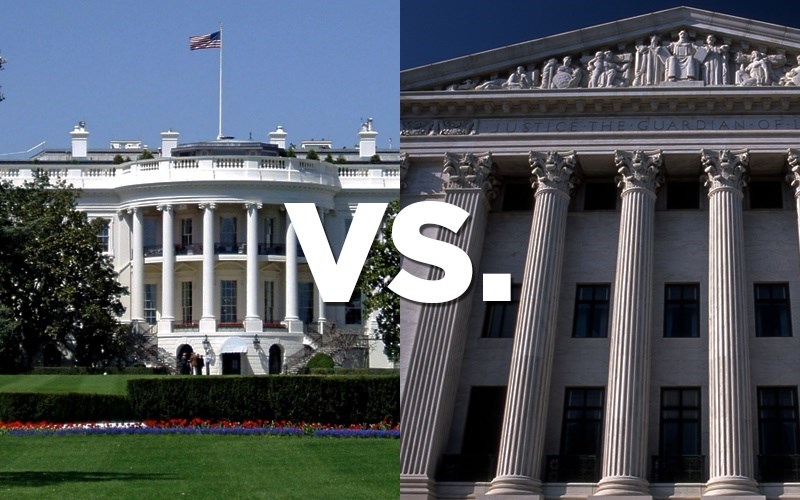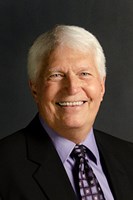

Dr. Ben Carson, to his everlasting credit, has raised the issue of whether or not a president can refuse to enforce an unconstitutional ruling of the Supreme Court.
In my opinion, and speaking just for myself, the answer to this question is, “Of course.” In fact, when circumstances require it, it may be that he must, or he will be false to his oath of office.
Such presidential courage may in the end be the only way to preserve our constitutional republic.
No president of the United States EVER takes an oath to uphold the rulings of the Supreme Court. His oath is to uphold the Constitution of the United States and to see that the laws passed by Congress are faithfully executed.
The Supreme Court, isn’t.
That is, it is not the supreme branch of government. It is one of three co-equal branches of government, none superior to the others. The genius of our Constitution, as crafted by the Founders, is the separation of powers, powers which are distributed equally among the three branches of government. No one is superior to the other, and each is to serve as a check and balance on the other two.
But through weak-willed surrender and wholly unjustified capitulation, the Supreme Court has been allowed by a sheep-like public, and by sheep-like congressmen and presidents, to acquire a supremacy it is not given by the Constitution, a tyrannical supremacy it is not entitled to, an oligarchical supremacy that must be challenged if America as founded is to survive.
Thomas Jefferson pointed out that each branch of government is perfectly capable of deciding for itself what is constitutional and what is not. None of the branches is required by the Constitution the Founders gave us to defer to members of either of the other two branches on questions of constitutionality.
Wrote Jefferson (emphasis mine throughout), "The question whether the judges are invested with exclusive authority to decide on the constitutionality of a law has been heretofore a subject of consideration with me in the exercise of official duties. Certainly there is not a word in the Constitution which has given that power to them more than to the Executive or Legislative branches."
If the Supreme Court issues a ruling that in fact violates the Constitution, the president must, in order to be true to the oath he took before God, follow the Constitution rather than the Court. It would be dereliction of duty for him to allow the justices to wipe their feet on the document he swore to uphold. If it’s a choice between the Supremes and the Constitution, he must choose the Constitution every time.
Jefferson correctly pointed out that if congressmen and senators ignore the Constitution, the people have a remedy: elections. They can elect different congressmen and senators. And if a president ignores the Constitution, the people have a remedy: they can elect a new president who reveres the Constitution and will abide by it. The American people will have just such a chance in 2016.
But there is no such remedy if the Supreme Court arrogates to itself power it does not rightly possess, since justices are not elected by the people and not directly accountable to them.
Said Jefferson in a letter to Abigail Adams, "The Constitution... meant that its coordinate branches should be checks on each other. But the opinion which gives to the judges the right to decide what laws are constitutional and what not, not only for themselves in their own sphere of action but for the Legislature and Executive also in their spheres, would make the Judiciary a despotic branch."
He added at another place, "To consider the judges as the ultimate arbiters of all constitutional questions [is] a very dangerous doctrine indeed, and one which would place us under the despotism of an oligarchy.”
It is a legal fiction that Supreme Court rulings are “law.” They are not. They are just what we call them, rulings. A ruling is not a law.
A law, by definition, is something passed by Congress, and according to the Constitution, ALL legislative power, every last bit of it, is vested in Congress. The Supreme Court doesn’t have any authority whatsoever to make law even if it wants to.
As President Andrew Jackson put it, “Each public officer, who takes an oath to support the Constitution, swears that he will support it as he understands it, and not as it is understood by others.”
Now a perfectly horrible and unconstitutional ruling (think Dred Scott or Roe v. Wade) may wind up having the force of law only if everyone meekly and abjectly defers to it.
A president may simply refuse to enforce an unconstitutional ruling. Who is there among us who would criticize a president who refused, for instance, to enforce the Dred Scott decision? Such a president would have become an American hero, struck a fatal blow to the institution of slavery, and perhaps averted a Civil War.
States can also serve as a check on uncontrolled Supreme Court power. Texas even now is considering legislation that would make a Supreme Court ruling imposing sodomy-based marriage on the United States of no effect in the Lone Star State.
Would such actions on the part of presidents or states represent anarchy? Is it rebellion? Hardly. It is in fact representative democracy at work. It’s the way our constitutional republic is designed to operate.
It’s always a good idea to listen to Thomas Jefferson. And it’s never been more important than it is today.

